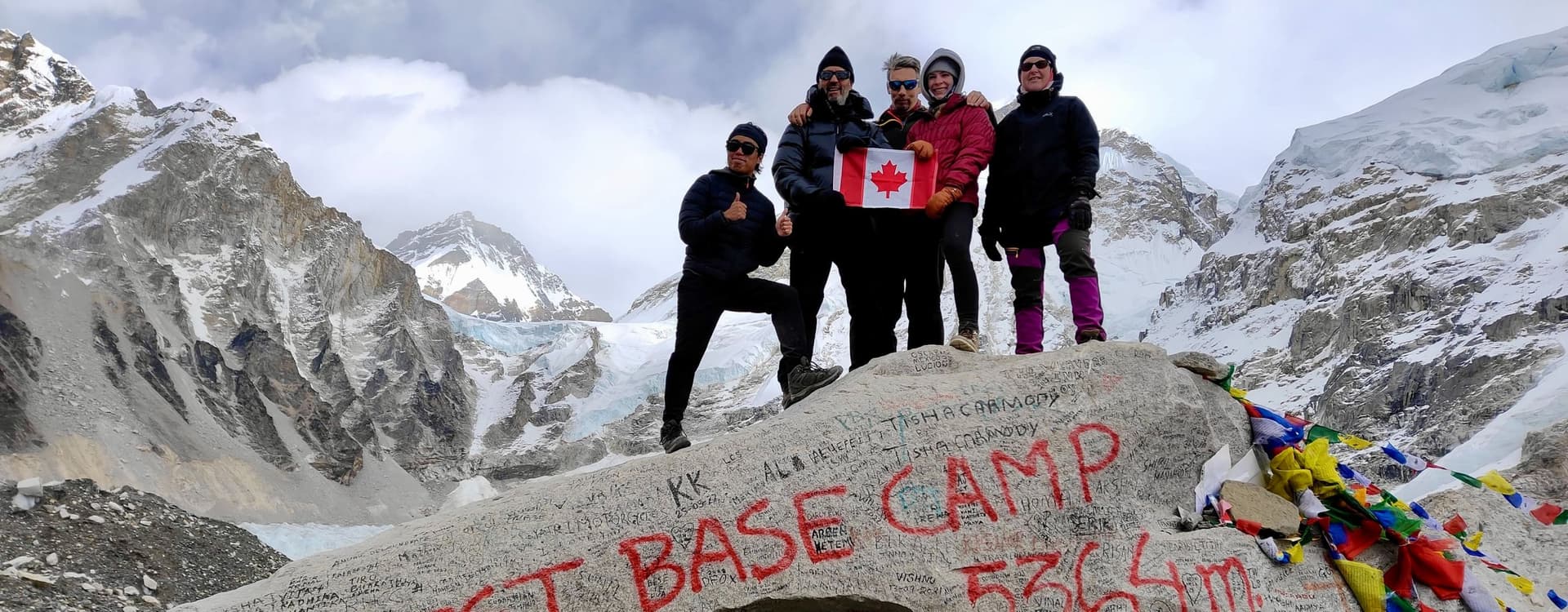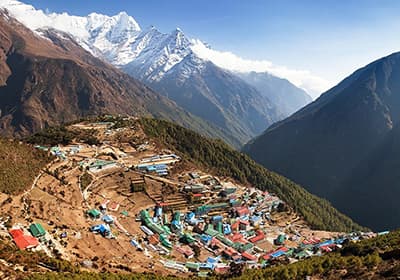You're scrolling through endless Everest Base Camp trek websites, and the prices are all over the map. $1,200? $3,000? Why such huge differences for the same destination?
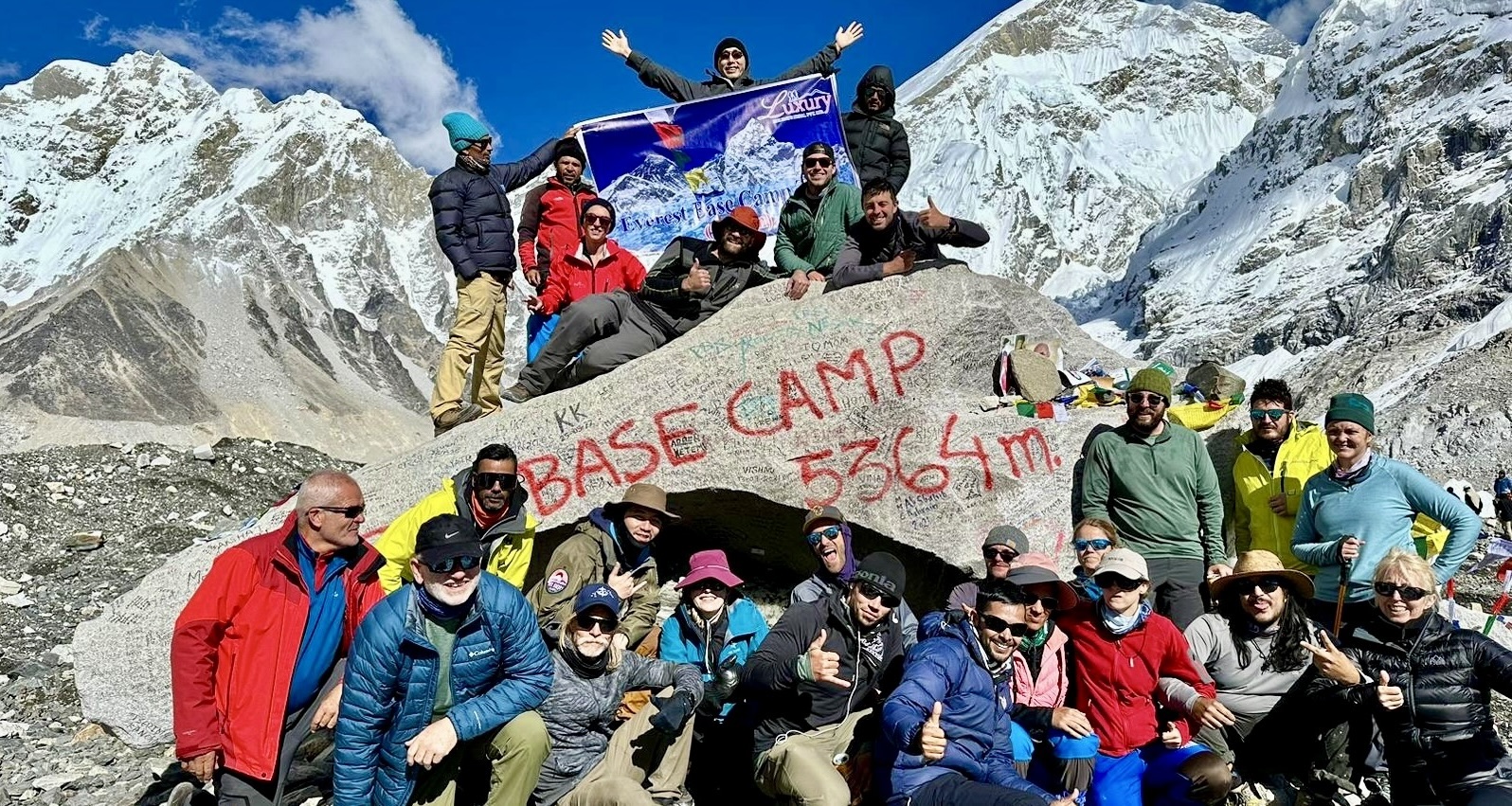
I've been there – that moment of panic when you wonder if you're about to overpay or book a dangerously cheap trek to one of the world's most iconic destinations.
The real cost of an Everest Base Camp trek typically ranges from $1,200 to $4,500, depending on several factors that many trekkers don't consider until they're already in Kathmandu with their credit card out.
But here's what nobody tells you about EBC trek pricing – the cheapest option almost always comes with hidden costs that can turn your dream adventure into a nightmare.
Overview of Everest Base Camp Trek
What makes this trek a bucket-list experience
The Everest Base Camp trek isn't just another hike – it's the adventure of a lifetime. We've guided countless trekkers through this legendary route, and the look on their faces when they first glimpse the mighty Everest tells us everything. Standing at 17,598 feet with the world's highest peak towering above you creates a feeling that's impossible to describe.
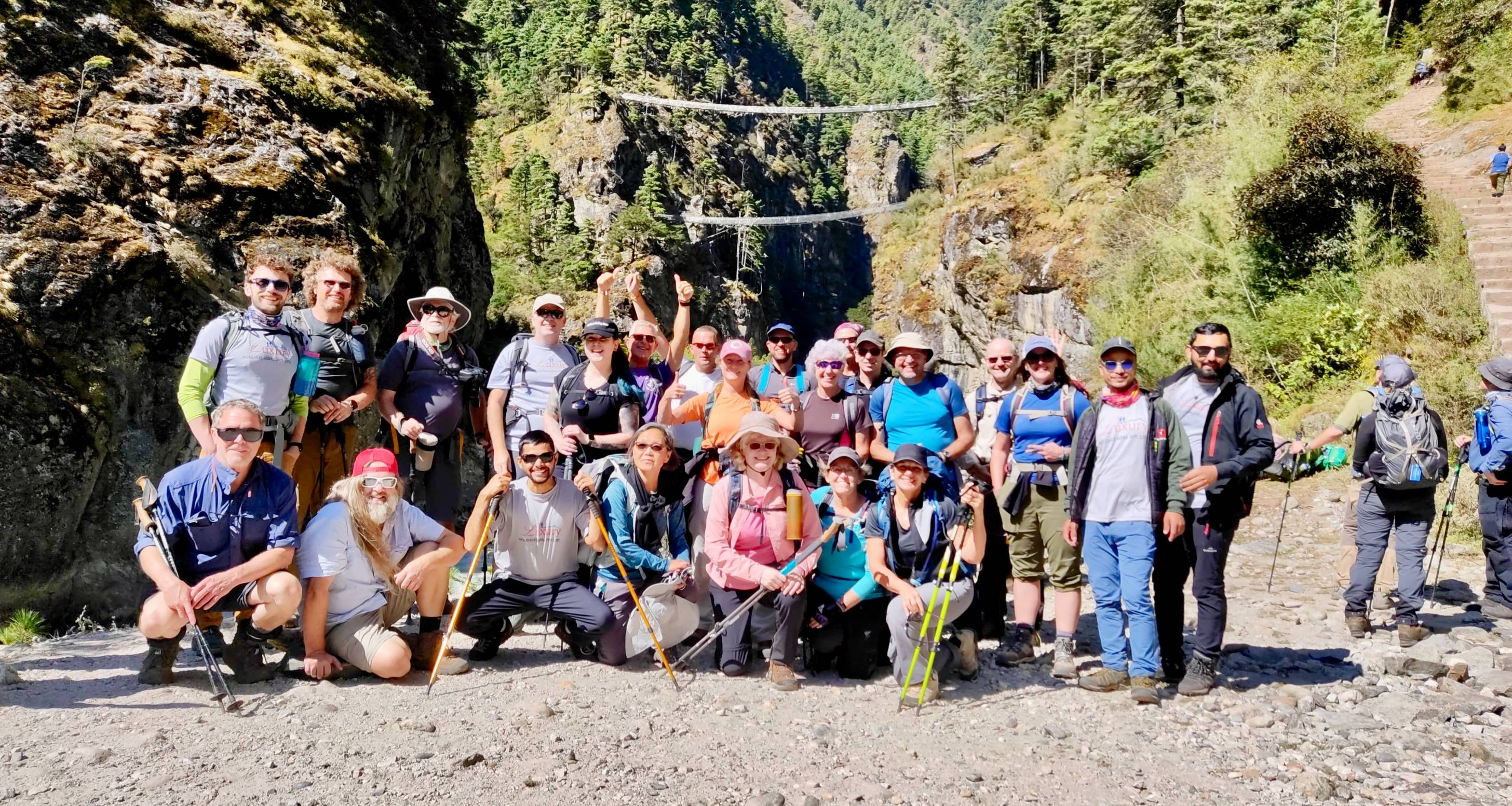
Beyond the bragging rights, this trek offers something truly special: a journey through the heart of Sherpa culture. We'll introduce you to local families, visit ancient monasteries, and share butter tea with people who've called these mountains home for generations.
The landscapes? Simply breathtaking. From lush forests and rushing rivers to stark, beautiful alpine terrain, every day brings new wonders. And nothing beats those star-filled Himalayan nights – the Milky Way so clear you'll feel you could reach out and touch it.
Brief route description and highlights
Our journey begins with the thrilling flight to Lukla (the world's most exciting airport, trust us!). From there, we trek through charming villages like Namche Bazaar – the bustling Sherpa capital, where we spend time acclimatizing while exploring local markets and enjoying surprising comforts.
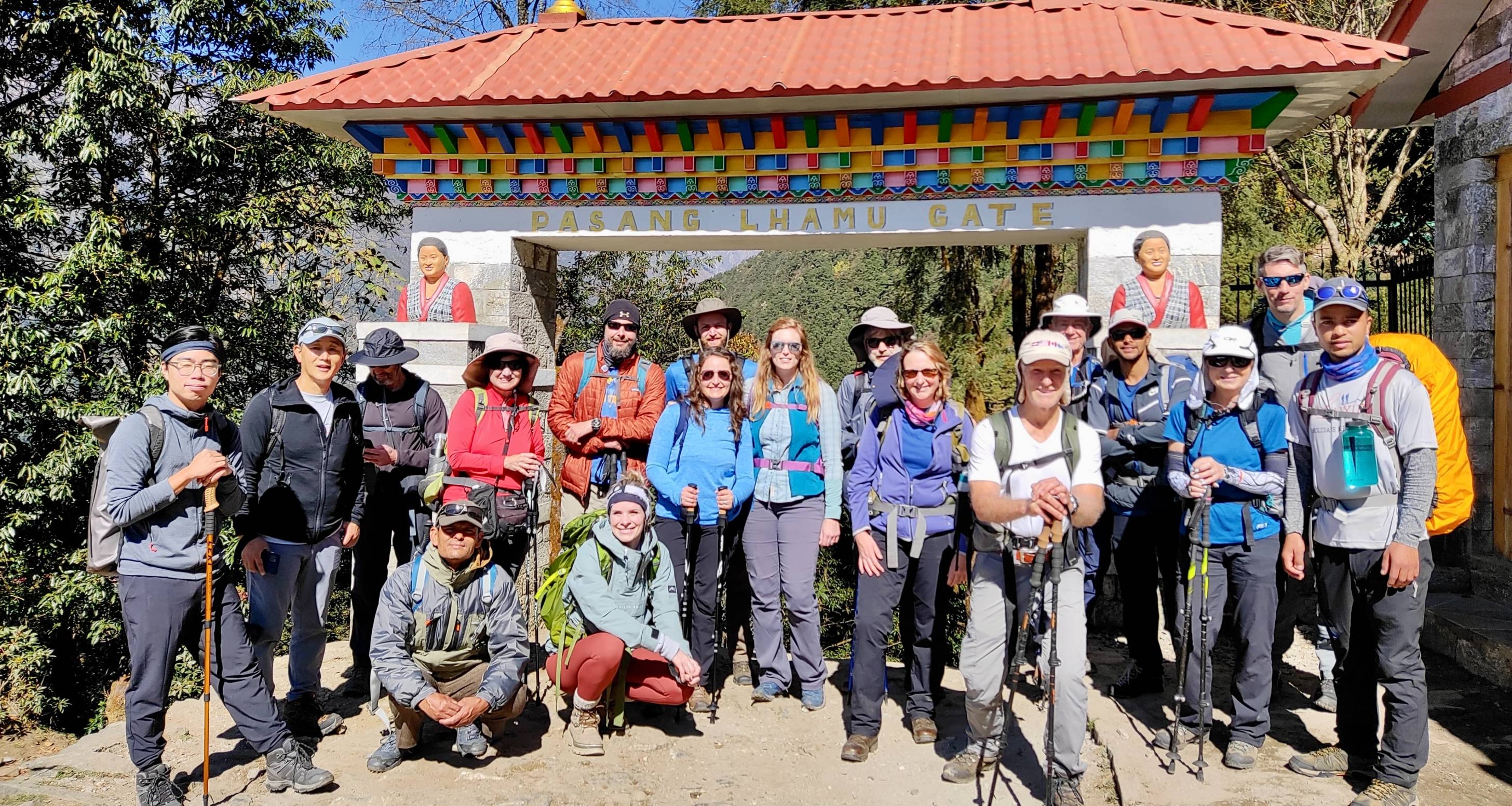
Key highlights along our route include:
- Tengboche Monastery, where monks perform ceremonies against the backdrop of Everest
- The memorial site honoring fallen climbers, a humbling reminder of the mountain's power
- Kala Patthar viewpoint, offering the most spectacular sunrise views of Everest
- The actual Everest Base Camp, where you'll walk among expedition tents during the climbing season
Duration options (standard 14-day vs. shorter/longer variations)
We offer several itinerary options to match different schedules and fitness levels:
| Trek Duration | Days on Trail | Best For |
| Standard (14 days) | 12-day trekking | Most trekkers - optimal acclimatization |
| Short (12 days) | 10-day trekking | Time-constrained, physically fit trekkers |
| Extended (16-18 days) | 14-16 days trekking | Those wanting side trips (Gokyo Lakes, etc.) |
| Rapid (10 days) | 8 days of trekking | Very experienced high-altitude trekkers only |
Our standard 14-day package strikes the perfect balance, allowing proper acclimatization while keeping the adventure manageable for most reasonably fit trekkers.
Best seasons for trekking to EBC
We've trekked this route in every season, and each offers something different:
- Pre-monsoon (March-May): Our favorite! Warm days, rhododendrons in bloom, and clear morning views. May brings early monsoon clouds but fewer crowds.
- Post-monsoon (September-November): The most popular season with stable weather, crystal-clear mountain views, and vibrant festival celebrations in local villages.
- Winter (December-February): For the adventurous! Fewer trekkers, pristine snow-covered landscapes, and surprising blue-sky days. Colder nights require better gear.
- Monsoon (June-August): The challenging season with rain, leeches, and often clouded views. However, it offers lush landscapes and solitude for those willing to brave it.
Complete Cost Breakdown of EBC Trek
Permits and Entry Fees
If you're planning the iconic Everest Base Camp (EBC) trek, you’ll need to obtain the following permits to legally and safely enter the trekking regions:
- Sagarmatha National Park Entry Permit – USD 22 (NPR 3,000) per person
- Where to Get It: Available at the Nepal Tourism Board office in Kathmandu or at the park entry checkpoint in Monjo.
- Khumbu Pasang Lhamu Rural Municipality Permit – USD 15 (NPR 3,000) per person
- Where to Get It: Issued at Lukla or at the rural municipality office in Monjo.
Note: The TIMS card is no longer mandatory for EBC trekkers via Lukla, as the Khumbu permit now covers that requirement.
Gaurishankar Conservation Area Permit (Optional Route) – USD 15 (NPR 3,000) per person
When Required: Only for trekkers entering from lower routes like Jiri or Salleri.
Where to Get It: Nepal Tourism Board office in Kathmandu.
Transportation Costs
The most common way to start the trek is flying from Kathmandu to Lukla. These flights typically cost $180-200 one way, so budget $360-400 for the round trip. Flights fill up quickly during peak season, so we always recommend booking well in advance.
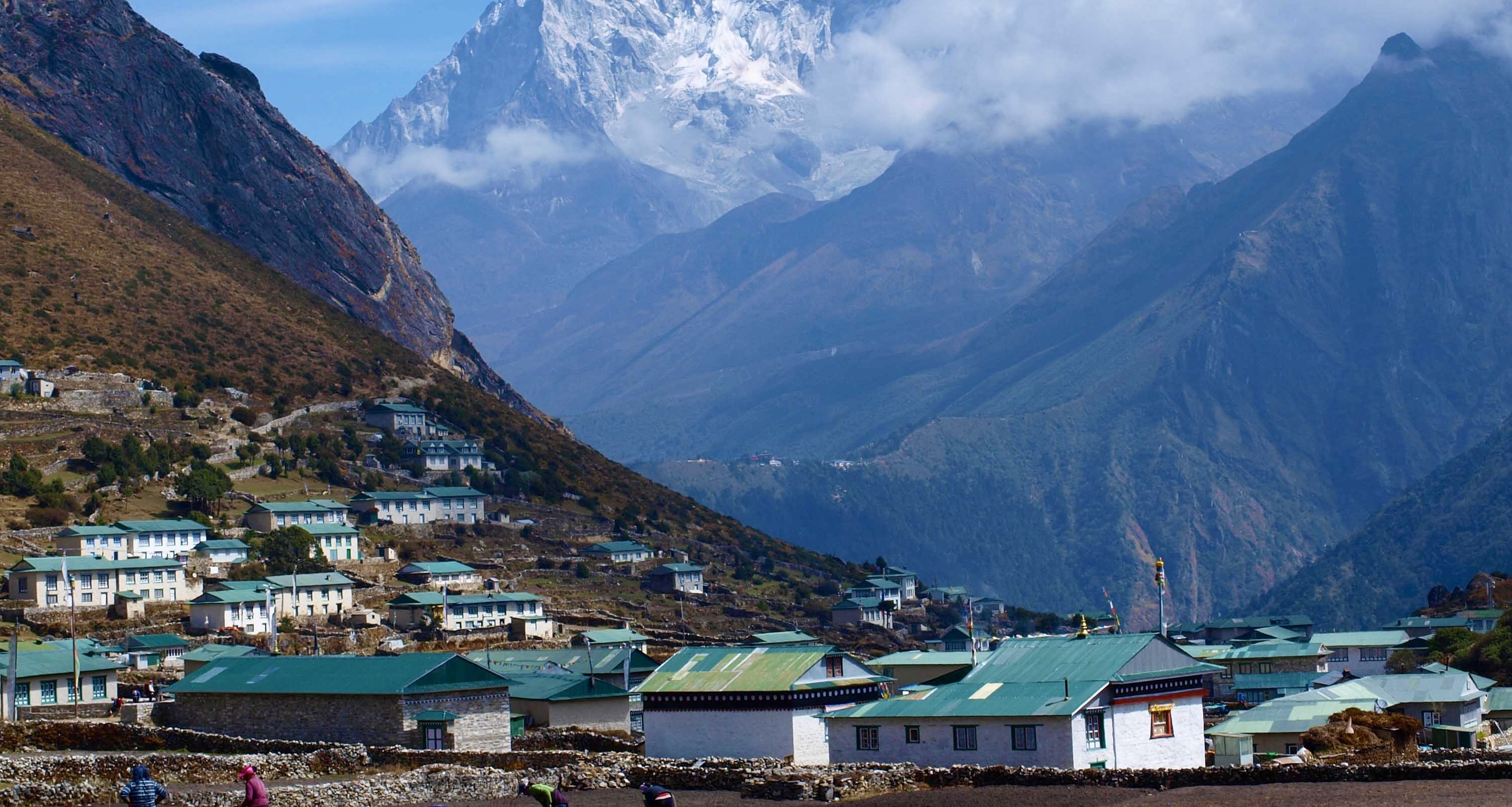
Many trekkers now choose a helicopter return from Lukla or even from higher points like Gorak Shep or Everest Base Camp. These luxury options range from $500 (shared helicopter from Lukla) to $3,500 (private helicopter from EBC).
Accommodation Expenses
Teahouses along the EBC route charge between $5-15 per night for basic rooms. Prices increase with altitude, with lower villages like Phakding charging around $5, while Gorak Shep (the highest accommodation point) costs about $15 per night.
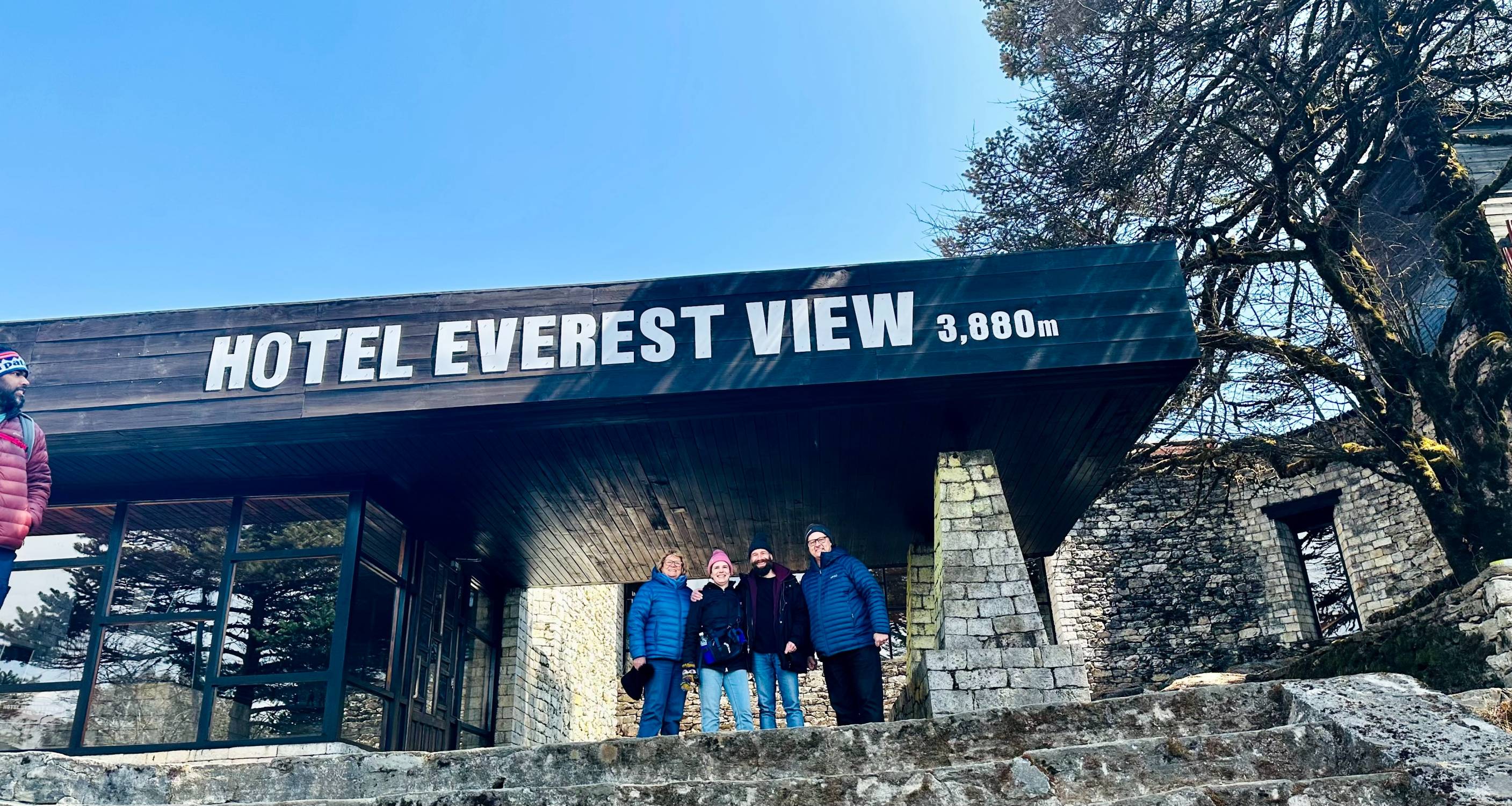
During peak season, most teahouses operate on a half-board system, meaning you must eat dinner and breakfast at your accommodation. The rooms are basic with twin beds and minimal amenities. Some lodges in Namche Bazaar offer rooms with attached bathrooms and hot showers for $25-40.
Food and Beverage Costs
Food prices climb with the altitude, reflecting the difficulty of transporting supplies. A typical meal costs $5-8 in lower regions and $8-15 at higher elevations. Dal bhat (rice and lentils) offers the best value as it usually comes with free refills.
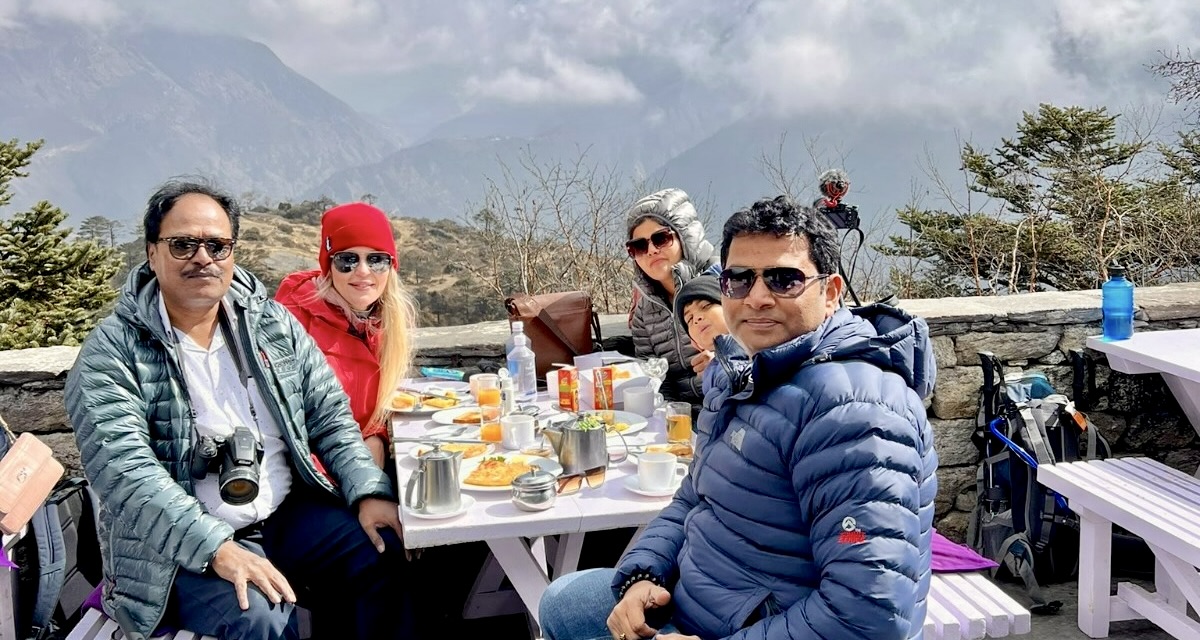
Hot drinks range from $1.50-4, with a cup of tea costing around $2 at most stops. Bottled water starts at $1.50 and reaches $4 at higher altitudes. We recommend bringing water purification tablets or a filtering system to save money and reduce plastic waste.
Guide and Porter Fees
A licensed guide costs $25-35 per day, while porters charge $20-25 daily. For a standard 12-14 day EBC trek, expect to pay $300-490 for a guide and $240-350 for a porter. These professionals deserve tips of 10-15% for good service.
Many trekkers wonder if guides are necessary. While the trail is well-marked, we strongly recommend hiring a guide for safety, cultural insights, and emergency assistance. Porters typically carry up to 25kg (55lbs) and make the journey much more enjoyable by letting you focus on the incredible scenery instead of your heavy backpack.
Luxury Holidays Nepal Package Options
Standard EBC Trek Package Inclusions
Our standard Everest Base Camp trek package covers all the essentials you need for a successful journey. We include airport transfers, three nights accommodation in Kathmandu at a 3-star hotel, domestic flights to and from Lukla, teahouse accommodations throughout the trek, three meals daily while trekking, an experienced English-speaking guide, necessary porters (one porter for two trekkers), all required permits (Sagarmatha National Park and TIMS card), and comprehensive first aid supplies.
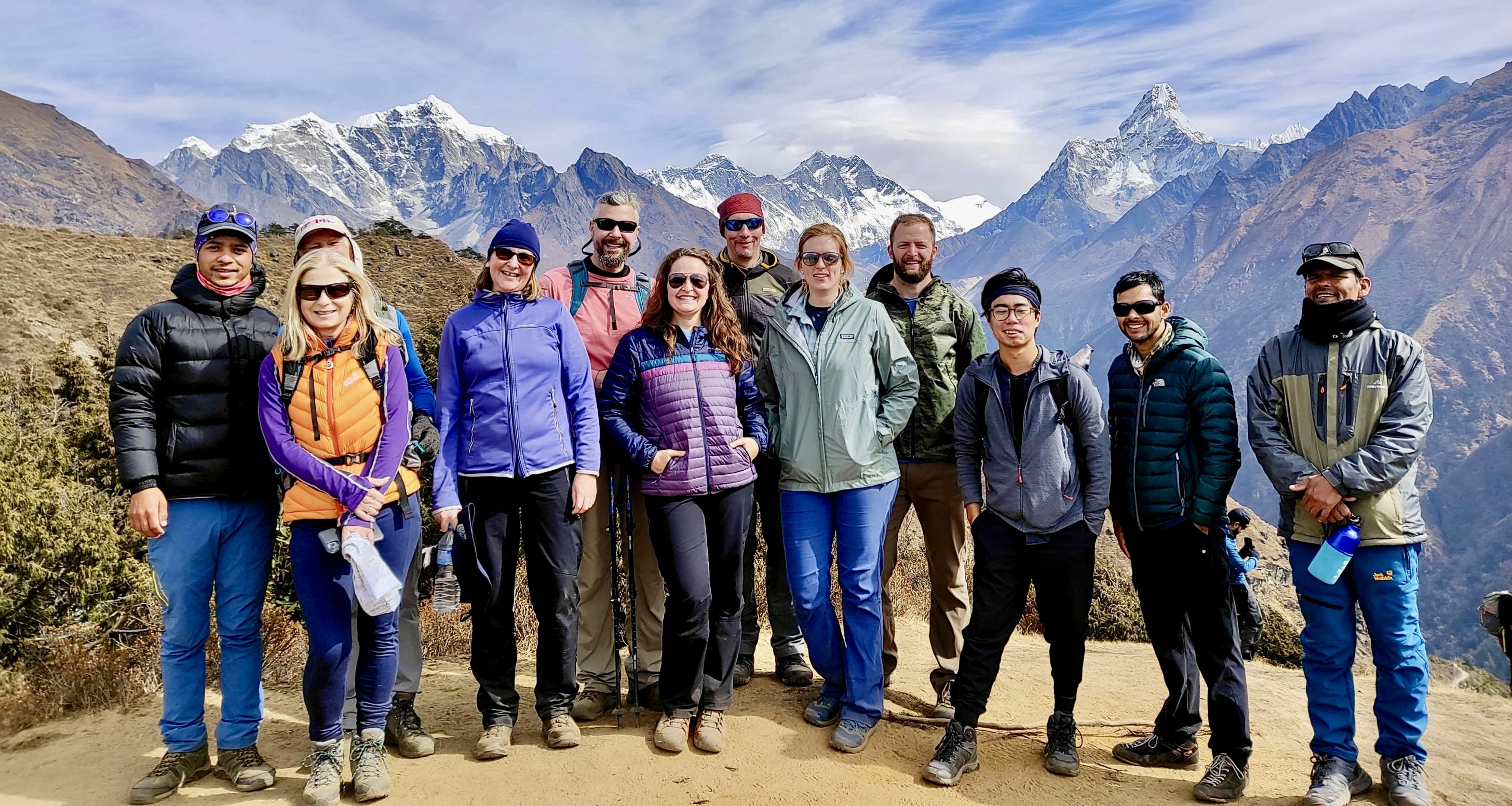
We don't skimp on safety either. Our standard package includes travel insurance for all guides and porters, plus emergency helicopter evacuation arrangement service. The package price typically ranges from $1,400 to $1,800 per person, depending on group size and season.
Premium/VIP Package Benefits
Want to take your Everest experience up a notch? Our premium Everest packages start from $2,500 and include some serious upgrades. You'll stay at 4-5 star hotels in Kathmandu and the best available lodges on the trek route - often with attached bathrooms where available.
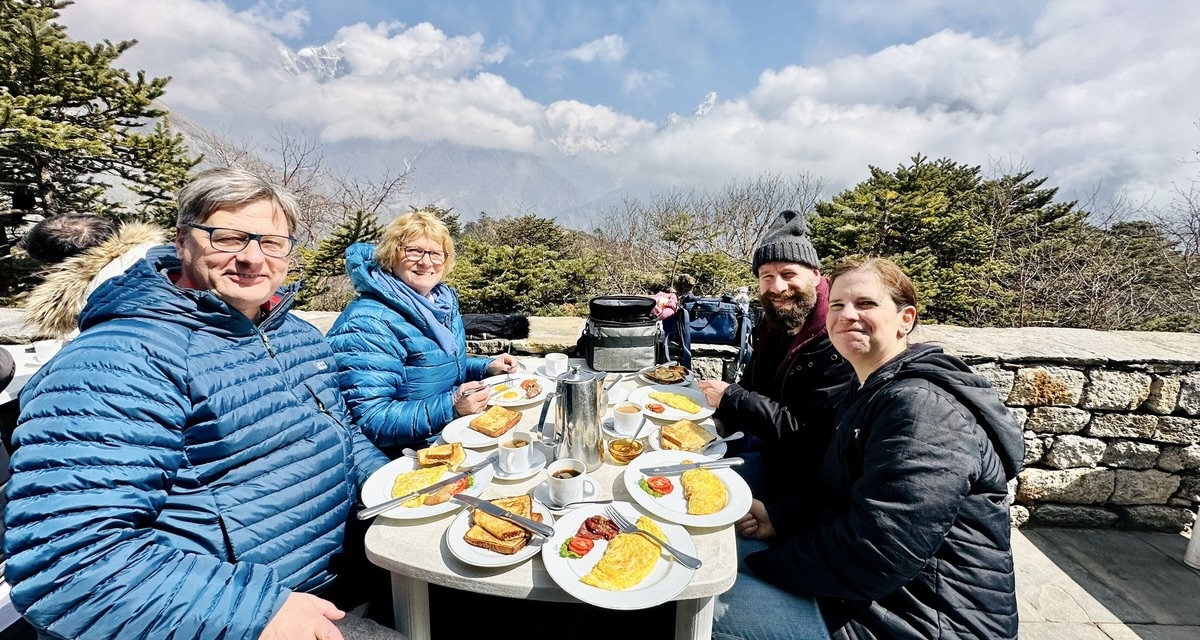
We provide premium down jackets and sleeping bags (yours to keep after the trek), private transportation, a dedicated personal porter, and higher-quality meals with more menu options. Our VIP trekkers also enjoy unlimited bottled water, daily oxygen saturation checks, enhanced communication devices, and portable charging stations.
The biggest difference? Our VIP packages feature highly experienced senior guides who've summited Everest multiple times and know every inch of the trail.
Group vs. Private Trek Pricing Differences
The math is simple here:
| Trek Type | Price Range (per person) | Group Size | Key Benefits |
| Group Trek | $1,400-$1,800 | 8-12 people | More affordable, social experience |
| Small Group | $1,800-$2,200 | 4-7 people | Balance of cost and personalization |
| Private Trek | $2,200-$3,000 | 1-3 people | Flexible itinerary, personalized pace |
Group treks offer substantial savings, but follow fixed departure dates and itineraries. Private treks cost more but give you complete control over your schedule and pace. Many of our clients find small group treks hit the sweet spot - some cost savings while still maintaining a more intimate experience.
Special Add-ons and Customization Options
We love helping you create your perfect trek. Popular add-ons include:
- Helicopter return from Lukla ($350-$500 per person)
- Side trips to Gokyo Lakes ($400-$600 extra)
- Island Peak climbing extension ($1,200)
- Photography guides ($75 per day)
- Personal yoga sessions during acclimatization days ($40 per session)
- Cultural homestay experiences ($100-$150)
We can also arrange luxury upgrades like heated blankets, gourmet meal options, and even birthday/anniversary celebrations at Base Camp. Just ask!
The beauty of our customization options is that you can mix and match to create exactly the experience you want. Some trekkers choose standard accommodations but splurge on a helicopter return, while others prioritize premium lodges but stick with regular group itineraries.
Additional Expenses to Consider
Equipment Rental or Purchase Costs
When planning your Everest Base Camp trek, gear costs can add up quickly. Here's what you need to budget for if you don't already own the necessary equipment:
| Item | Rental Cost (per day) | Purchase Cost |
| Down jacket | $2-4 | $80-250+ |
| Sleeping bag (-20°C) | $2-4 | $100-300 |
| Trekking poles | $1-3 | $30-100 |
| Backpack | $2-4 | $60-200 |
| Crampons | $3-5 | $50-150 |
We recommend renting expensive items in Kathmandu if you don't trek regularly. Many shops in Thamel offer quality rental gear at reasonable prices. For items like thermal underwear and socks, buying new is better for hygiene reasons.
Travel Insurance Requirements and Prices
Travel insurance isn't just recommended for the EBC trek—it's essential. You absolutely need coverage that includes:
- High-altitude trekking (above 5,500m)
- Emergency helicopter evacuation
- Medical expenses up to $100,000+
Most standard travel policies won't cover these, so check carefully! We've found comprehensive policies typically cost between $80-200 for a two-week trek, depending on your age and home country. World Nomads and InsureAndGo offer suitable packages for trekkers.
Tips for Guides and Porters (Recommended Amounts)
Tipping is an important part of the trekking culture. Our recommended tipping guidelines:
- Guides: $10-15 per day per group
- Porters: $5-8 per day per porter
- Assistant guides: $8-10 per day per group
For a 14-day EBC trek, budget around $150-250 total for tips. We always suggest collecting tips from all group members and presenting them together at the end of your trek.
Personal Expenses and Souvenirs
Daily expenses on the trail add up faster than most trekkers expect. Budget for:
- Hot showers: $3-7 (prices increase with altitude)
- Wi-Fi: $3-10 per use/day
- Battery charging: $2-5 per device
- Extra snacks: $5-10 per day
- Bottled water: $2-5 per liter (or free with water purification)
Don't forget souvenirs! Prayer flags, singing bowls, and Nepali tea make great mementos ($5-50). Many trekkers spend $10-15 daily on extras, so budget at least $150-200 for a typical 14-day trek.
Ways to Manage Your Budget
Peak vs. off-season price differences
Timing is everything when planning your Everest Base Camp Trek budget. We've noticed prices can swing dramatically between peak and off-seasons. During peak seasons (March-May and September-November), expect to pay 15-30% more for everything from accommodations to flights.
Peak season prices typically range:
- Teahouse accommodation: $10-15 per night
- Meals: $8-12 per meal
- Guide services: $30-35 per day
Off-season (December-February and June-August) offers substantial savings:
- Teahouse accommodation: $3-8 per night
- Meals: $5-9 per meal
- Guide services: $20-25 per day
The off-season comes with fewer crowds and better deals, but you'll face monsoon rains or winter cold. We often recommend October-November for first-timers – slightly higher prices but perfect weather conditions.
Group size impact on costs
The math is simple: more trekkers equals lower per-person costs. We've organized hundreds of treks and seen how group size dramatically affects budgets.
| Group Size | Cost Per Person (USD) | Savings vs. Solo |
| Solo | $1,800-2,200 | - |
| 2-3 people | $1,500-1,800 | ~20% |
| 4-8 people | $1,200-1,500 | ~35% |
| 9+ people | $1,000-1,300 | ~45% |
Joining a larger group means shared guide costs, group discounts on accommodations, and potentially shared porter expenses. However, larger groups move more slowly and offer less flexibility with itineraries. We find groups of 4-6 strike the perfect balance between savings and experience quality.
Tea house vs. camping trek cost comparison
We've guided clients on both tea house and camping treks, and each offers distinct budget considerations.
Tea house treks typically cost $25-35 per day, covering:
- Basic accommodation
- Simple meals
- Hot drinks
Camping treks run $40-50 daily, including:
- All camping gear
- More elaborate meals
- Extra porter costs for the equipment
While camping seems pricier upfront, it offers better value in remote areas where tea houses charge premium rates. Tea house treks win on convenience and warmth, but camping provides better food quality and hygiene control. For EBC specifically, we recommend tea houses for most trekkers – they're the more economical choice on this popular route.
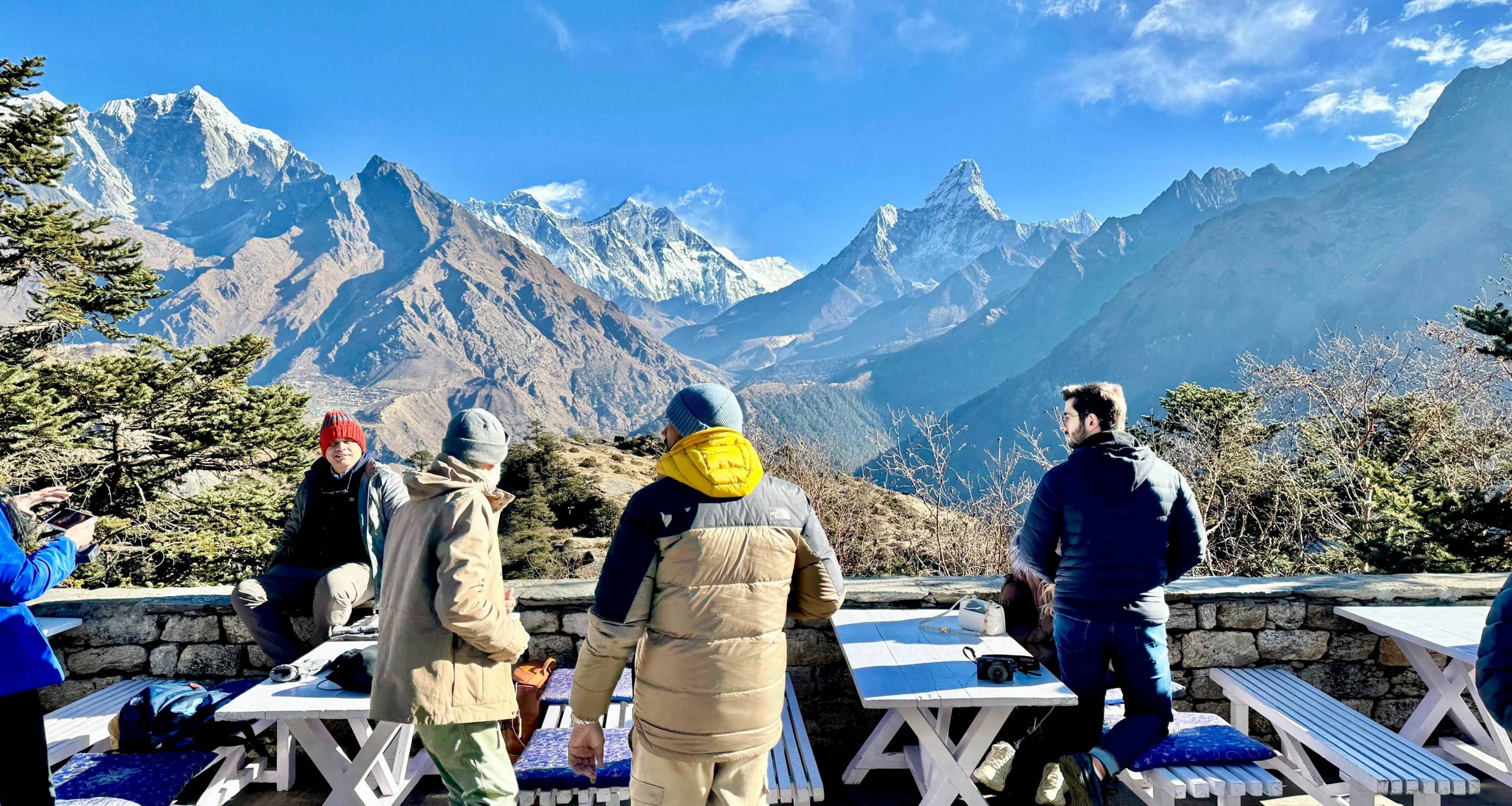
Money-saving tips without compromising experience
Saving money doesn't mean skimping on safety or enjoyment. Our favorite budget-friendly strategies include:
- Pack smartly – bring your own snacks, basic medications, and water purification tablets
- Eat vegetarian – meat costs 30-50% more at higher elevations
- Skip alcohol – overpriced and affects acclimatization anyway
- Negotiate longer teahouse stays – multi-night discounts add up
- Carry sufficient cash to avoid ATM fees ($5-7 per transaction)
- Share porters between 2-3 trekkers instead of hiring individually
- Book domestic flights well in advance (saving up to $40-60)
- Choose a slightly longer itinerary – rushing requires expensive helicopter evacuations when altitude sickness strikes
We've seen trekkers save $200-300 just by implementing these strategies without cutting corners on the experience quality.
Currency and payment considerations
Managing money correctly makes a huge difference in your overall trek budget. We always advise:
- Bring crisp USD bills printed after 2009 (older notes aren't accepted)
- Exchange only at official banks in Kathmandu (5-7% better rates than hotels)
- Withdraw larger amounts less frequently from ATMs to minimize fees
- Keep small Nepali rupee denominations handy for teahouses and small purchases
- Budget an extra 10-15% as emergency cash (stored separately)
Credit cards work in Kathmandu and Namche Bazaar, but come with 3-4% processing fees. Beyond Namche, it's cash-only territory. Most teahouses now accept USD, but you'll get better value using rupees. We recommend carrying about $15-20 per day in local currency plus your emergency reserve.
Value-Added Services from Luxury Holidays Nepal
Pre-trek preparation assistance
We don't just send you off to Everest Base Camp with a map and a pat on the back. Our team works with you weeks before your departure to ensure you're physically and mentally prepared for the adventure ahead. We provide detailed packing lists tailored to the current season, personalized fitness regimens based on your current activity level, and direct access to our experienced trekking guides who've completed the journey hundreds of times.
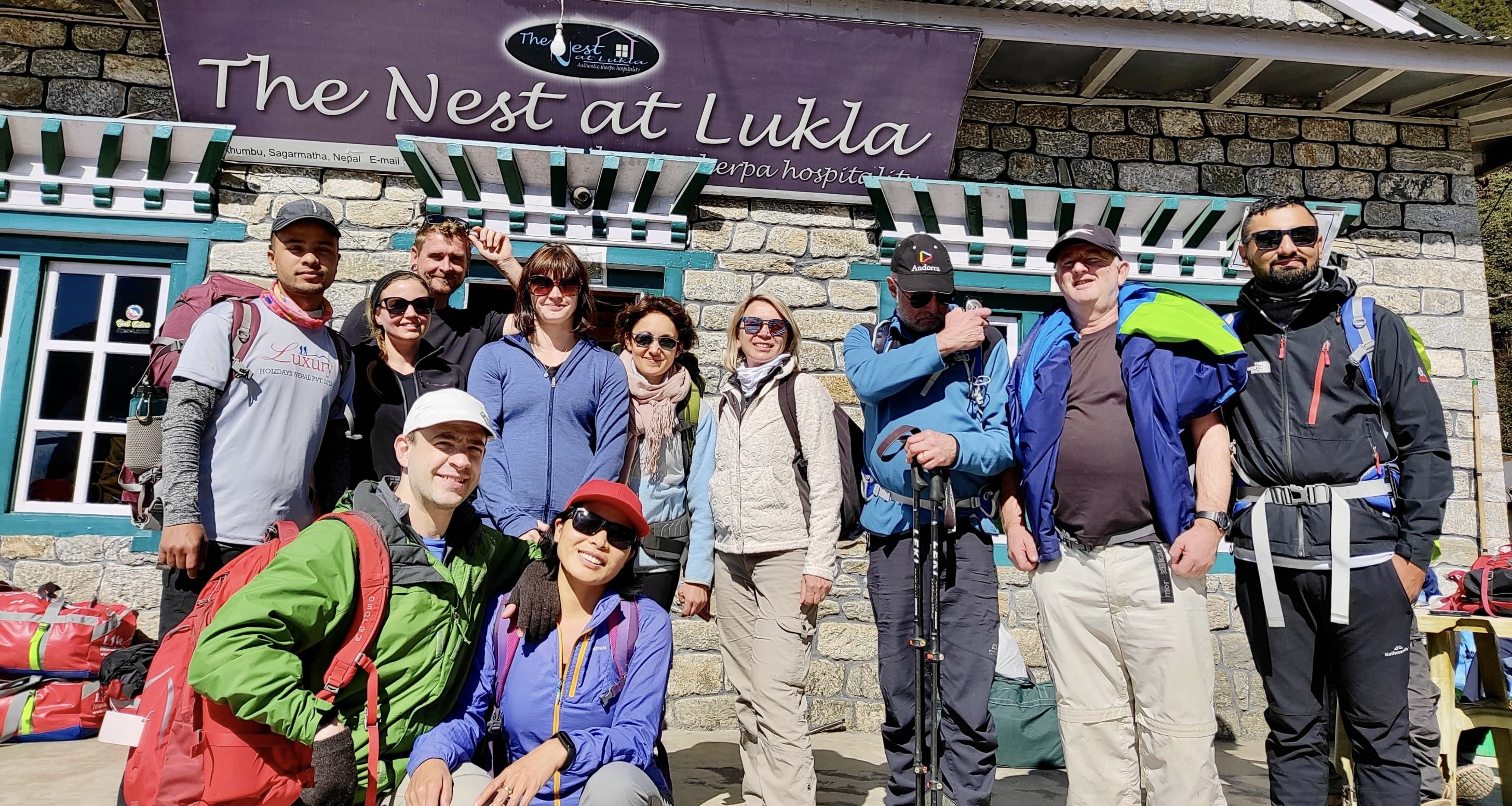
Our clients also receive exclusive access to our digital preparation portal with video tutorials on everything from proper layering techniques to altitude sickness prevention. We'll connect you with past trekkers who can share their firsthand experiences and tips that you won't find in guidebooks.
Emergency evacuation arrangements
Your safety is our absolute priority. We've established a comprehensive emergency response system that includes 24/7 satellite communication with our Kathmandu office, partnerships with multiple helicopter evacuation services, and guides trained in wilderness first aid and high-altitude medicine.
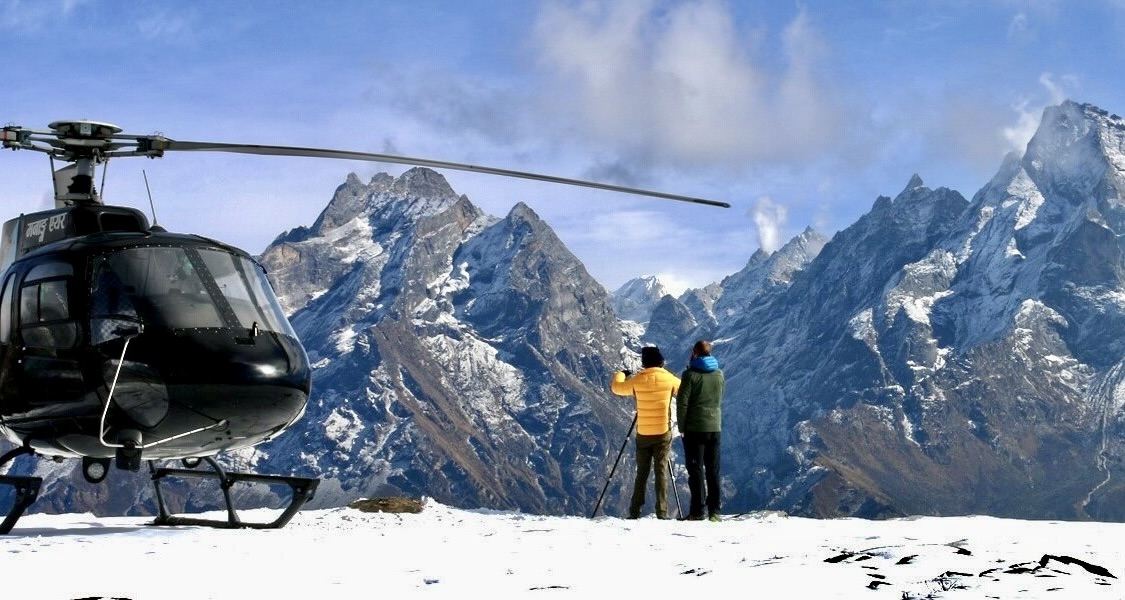
Unlike many budget operators, we include helicopter evacuation insurance in our packages. We maintain detailed medical records of each trekker and have established relationships with clinics along the route and hospitals in Kathmandu. Our team conducts twice-daily health checks during the trek to catch potential issues before they become emergencies.
Cultural immersion opportunities
The Everest region isn't just about spectacular mountains – it's home to the incredible Sherpa culture with centuries of unique traditions. We've built relationships with local families who welcome our trekkers into their homes for traditional meals and cultural exchanges.
Our guides don't just point out mountains; they share stories of local deities, explain the significance of prayer flags and stones, and translate conversations with locals you meet along the way. We arrange special access to monasteries typically closed to tourists and coordinate with local festivals when possible.
Post-trek relaxation options
After conquering the challenging trek, your body deserves some serious pampering. We've curated several post-trek packages from luxurious spa treatments in Kathmandu's finest hotels to yoga retreats in peaceful Pokhara.
Many of our trekkers enjoy our exclusive post-trek dinner celebration, where you'll receive a certificate of achievement and connect with your fellow trekkers to share memories. For those with extra time, we can arrange short excursions to Chitwan National Park for wildlife safaris or peaceful stays at boutique lodges in the Kathmandu Valley, where you can reflect on your accomplishment while enjoying Nepal's renowned hospitality.
Client Testimonials and Experience Insights
Real cost experiences from past trekkers
We've gathered insights from hundreds of trekkers who've completed the Everest Base Camp trek with us. Most report spending between $1,200-$2,500 for a standard 14-day trek, not including international flights. This varies significantly based on trek style and personal spending habits.
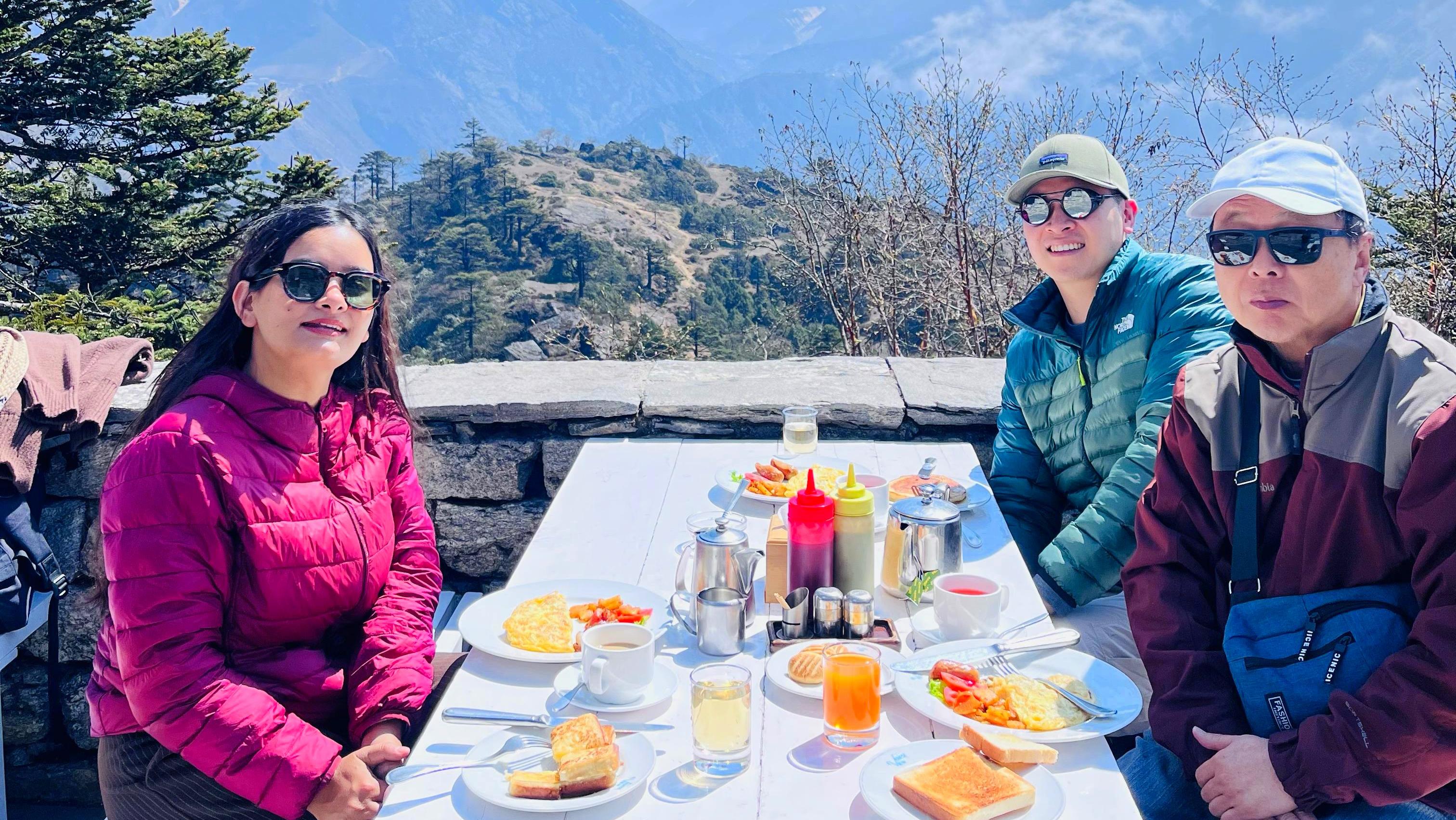
One recent client, Sarah from Australia, tracked every expense: "My total came to $1,890 for a mid-range package. I spent an extra $300 on tips, snacks and souvenirs that I hadn't budgeted for."
Another trekker, Mike from Canada, shared: "Going with a slightly premium package at $2,200 was worth every penny. The heated lodges and better food made a huge difference when temperatures dropped below freezing."
Value for money assessments
The consensus among our clients? The trek delivers incredible value considering the experience. Many compare it to other bucket-list adventures costing 3-4 times more.
James from the UK told us: "For what you get – Himalayan vistas, cultural immersion, and the achievement of reaching Base Camp – it's surprisingly affordable. The memories will last forever."
Budget packages ($1,100-$1,400) receive mixed reviews. Some trekkers love the no-frills approach, while others wish they'd invested in better accommodation and food options. Mid-range packages ($1,500-$2,000) consistently score highest for satisfaction and value.
Unexpected expenses reported by previous clients
We always try to be transparent about costs, but our past trekkers have highlighted some common unexpected expenses:
- Hot showers: $3-$5 per shower at higher elevations (and they're worth every penny!)
- Battery charging: $2-$5 per device, increasing with altitude
- Wi-Fi: $3-$8 per day in teahouses
- Extra snacks: $5-$10 daily for chocolate bars, cookies and other comfort foods
- Porters for extra weight: Some clients underestimated their packing and paid $20-$25/day for additional porters
As Amanda from the US noted: "I spent about $200 more than expected on small comforts – hot drinks, snacks, and warm showers. They made tough days so much better."
Most worthwhile splurges according to trekkers
Our returning trekkers consistently highlight certain splurges that enhanced their experience:
- Private rooms in teahouses: $10-$20 extra per night, but guarantees better rest
- Down jacket rental: $40-$50 for quality warmth without buying expensive gear
- Helicopter return: $350-$500 per person (with shared flight) saves days of trekking when energy is lowest
- Extra acclimatization day: Adding a rest day at Namche Bazaar ($50-$70) dramatically improves summit success rates
- Guide tips: Generous tipping ($100-$150) ensures exceptional service
Tom from Ireland summed it up perfectly: "Splurging on good quality socks, a few private rooms, and that helicopter ride back when I was exhausted – absolute game-changers."
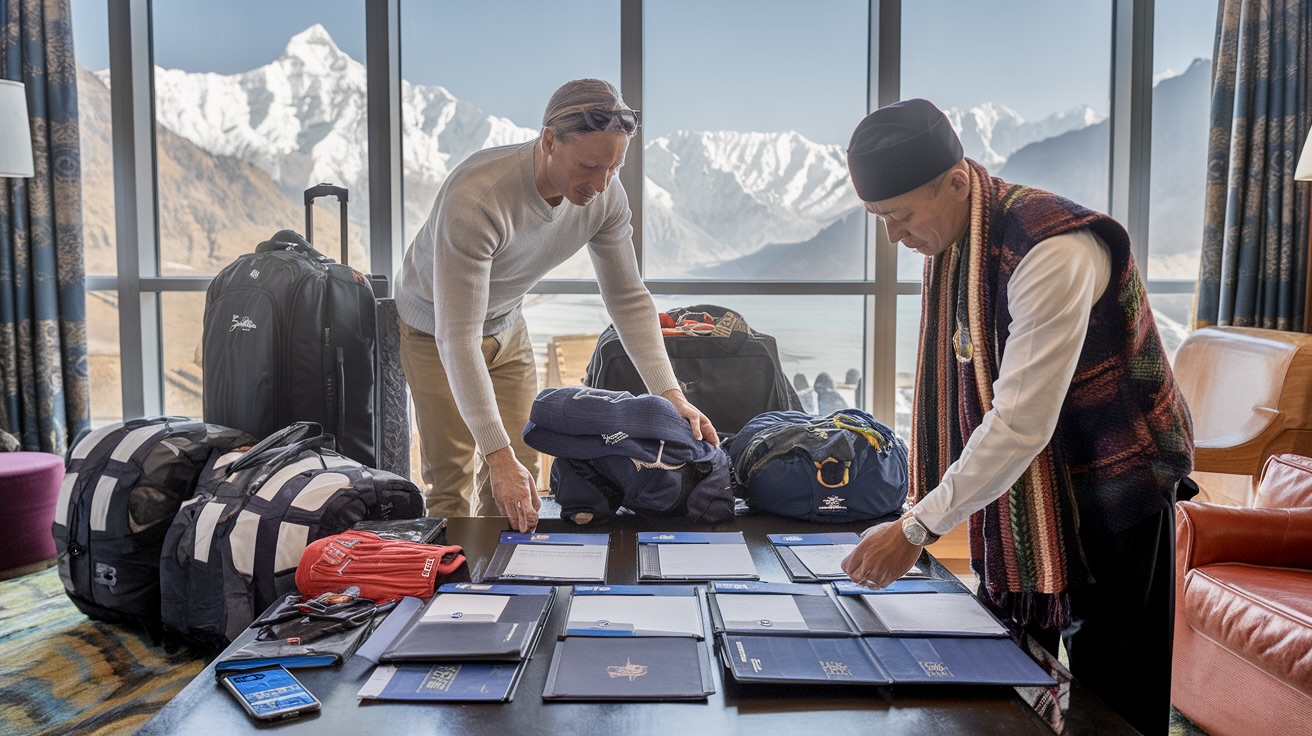
Trekking to Everest Base Camp is an adventure of a lifetime, with costs that can vary based on your travel style, season, and chosen services. As outlined in this guide, understanding the complete breakdown - from permits and transportation to accommodation and guides - allows you to plan effectively for this Himalayan journey. Luxury Holidays Nepal offers various package options designed to provide exceptional value while ensuring safety and comfort throughout your trek.
Remember that preparation is key to both enjoying your trek and managing your budget wisely. Whether you choose a standard package or opt for premium services, the memories created against the backdrop of the world's highest mountain are truly priceless.
Contact Luxury Holidays Nepal today to start planning your Everest adventure with experts who understand how to make your journey both memorable and well within your financial comfort zone.
If you need any further information, please contact us by email: [email protected], Phone: +977- 985 100 5129 (WhatsApp).

